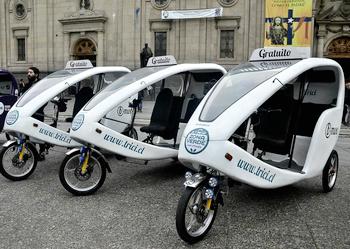
SANTIAGO, Chile, July 13, 2016 (ENS) – Chile’s capital city, Santiago, has just been awarded the honor of hosting Mobilize 2017, the new annual Sustainable Transport Summit put on by the New York-based multinational Institute for Transportation and Development Policy.
Over the past year, Santiago has made major improvements in pedestrian space, cycling, and public transit that earned it the ITDP’s recognition.
Established in 2005, the Sustainable Transport Award has been given each year to a city that has implemented innovative sustainable transportation projects in the preceding year.
The award recognizes “profound leadership, vision, and achievement in sustainable transportation and urban livability,” says the ITDP on its website.

Such strategies improve mobility for all residents, reduce transportation greenhouse and air pollution emissions, and improve safety and access for cyclists and pedestrians. Finalists are selected by an international committee of development experts and organizations working on sustainable transport.
“We received many interesting nominations this year, but Santiago stood out for their wide range of achievements, and demonstrates the benefits of a strategic focus on improving walking conditions as a top priority,” said Michael Kodransky, who chairs the Sustainable Transport Award Committee.
“We look forward to spotlighting Santiago in the coming year as an international best practice.”
Santiago Mayor Carolina Tohá said, “We are proud of this recognition to the municipality, but it’s certainly also recognition to the whole city. We have been actively promoting coordination processes with Santiago’s Board of Public Transportation, the Ministry of Environment, the Regional Government, civil society organizations and other municipalities.”

“Thanks to this coordination and collaboration we have been able to move forward in local projects with greater metropolitan impact, such as the System of Public Bicycles, the Plan Centro, the Green Zone and to double the bicycle’s path network,” said the mayor.
Santiago’s Calle Aillavilú, in the central market of the city, has been transformed from a derelict, car-congested and unregulated parking lot to a pedestrian-friendly oasis.
The street was repaved, the lighting improved, new trees were planted, and most importantly, cars were removed. Except for the scheduled delivery of goods, no motorized traffic is allowed.
Calle Placer, one of the busiest pedestrian streets during a popular weekend market, is now completely closed to cars on the weekends, with a US$2.2 million investment by the city that improved sidewalks, lighting, and sanitation.
Santiago also has re-designed the Historical Center’s main streets, and has done a “complete streets” redesign for public transport-only corridors in most active pedestrian zone.
The city has new sustainable transport policy and education programs that include a pilot project of cycling games in kindergarten to help introduce cycling early in life. A traffic education program at primary schools is helping create better cyclist behavior.
The city has managed to increase cycling trips from just 150 per day to over 5,000 a day, with the growing popularity of BikeSantiago, the city’s bike share program.

Santiago also gave support to BMov Trici, a free bicycle taxi in the historic city center that turned one year old in June.
As a result of all these improvements and programs, Santiago will be the site of Mobilize 2017, ITDP’s Sustainable Transport Summit, supported by the Volvo Research and Education Foundations.
This event will give international transportation researchers and professionals an opportunity to experience Santiago as an emerging city – a learning lab for best practice in sustainable transport.
Windhoek, Namibia and Curitiba, Brazil will receive honorable mentions this year.
Windhoek has modernized, expanded, and regulated its bus system.
Curitiba improved access to the city for people with disabilities, created a transport data system, and implemented an electric bike share system.
All three cities will be honored at an awards ceremony in Washington, DC in January 2017 during the annual meeting of the Transport Research Board.
Copyright Environment News Service (ENS) 2016. All rights reserved.
PHOTO: Cyclists and pedestrians enjoy Santiago’s car-free Calle Placer (Photo by throgers)
© 2016, Environment News Service. All rights reserved. Content may be quoted only with proper attribution and a direct link to the original article. Full reproduction is prohibited.
